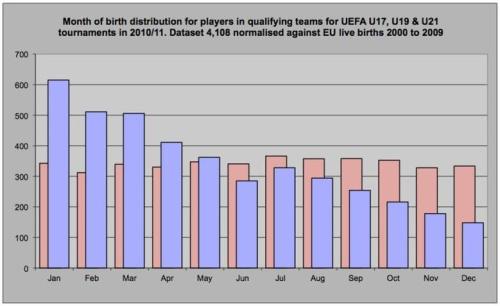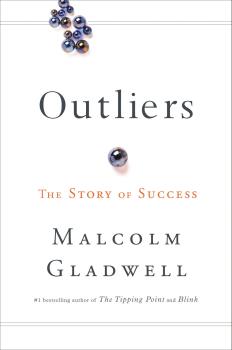Outliers: the story of success
Malcolm Gladwell
Gladwell, Malcolm;
Outliers: the story of success
Penguin Books, Allen Lane, 2008, 309 pages
ISBN 0141036249, 9780141036243
topics: | cognitive | neuro-psychology | brain | subconscious
This book ties up two threads - a. your birth age cohort affects your interest in sports, and b. if you spend enough time at it you can be a genius in any sport. Enough time = 20 hour per week for 20 years.
The heart of the argument is that success breeds success. As a child you find X interesting. You work at X. You become good at it. You receive feedback, you become better at it.
X may be violin playing, soccer, or chess.
It is not an inborn talent that drives you towards X. It may also be your relative age w.r.t. your cohort at school. Say, the boys who are somewhat older (just below the age cutoff imposed in most cultures) - tend to be better at sports than the others who are a few months their junior. Then these boys do a bit better, are coached a bit more, find themselves happier doing more of it, and end up becoming the greats. This is empirically validated by the finding that more Canadian ice hockey players have birthdates in the Jan-Feb range than in other months -and it drops as you get younger. [see figure below]
In the end, if you get to have 1000 hours a year of practice for 10 years, you become a genius in that area. This is a key result from research in the area of expertise. It is certainly true of chess grandmasters. In fact, it has been validated in wide ranging studies of expertise.
 image: wiki: Relative age effect
image: wiki: Relative age effect
The nature of expertise
In his 1991 book, Toward a general theory of expertise Karl Ericsson compiles evidence that the development of expertise in chess, physics, medicine, dance, sport, music, etc - all involve processes that build more and more compact representations of complex processes involving many strands of input and the complex responses to it.
You show a grandmaster a complex chess position for about 5 seconds and she will reconstruct the whole board. Do this for an average good chess player, they won't be able to do it even after double the time. This suggests that the grandmaster doesn't think of the board as 30-odd pieces. She sees some groupings or formations, technically called "chunks" - and she has thousands of chunks memorized. So every board is a set of 3 or 4 chunks that can be recognized in an instant. It's like storing phone numbers or reading. You can't remember ten random digits. But if your area code is 518, and the exchange is 845, then most of us can remember 1-518-845-2136 as a set of six chunks - 518, 845, and the four digits. As we become better and better at a task, e.g. reading, our subconscious - which is really the boss - learns to cluster elements (letters) together to form chunks (syllables, words). Also it learns what to expect, so the choices of possible inputs becomes narrower. That's hwo we cna rdea sntenecs taht hvae tberrile sllpenigs. And that's how sports heroes seem so superhuman. It's just that they have prepared their bodies (and brains). And while on the theme of expertise, here is a movie that underlines the point, which traces the chess development of grandmaster Susan Polgar. It also shows a number of other experiments including one by Anders Ericsson: My brilliant mind - Make Me A Genius, by National Geographic: And as for the birth-month, it simply makes things easier to get those incredibly many hours of practice. So may be there is more to sun signs than we had thought of!
Excerpts
1. The Matthew Effect
For unto everyone that hath shall be given, and he shall have abundance. But from him that hath not shall be taken away even that which he hath. --Matthew 25:29. the rich shall get richer and the poor, poorer yet. similarly, early success breeds bigger and bigger successes. but it must all begin with a piece of good fortune. MG starts by recounting how in sport after sport, the top athletes tend to be born just after the school-year cutoff - so they are just a shade bigger than their cohorts.distribution of birth-months of players in two Canadian major junior hockey leagues (the Ontario Junior Hockey League and the Western Hockey League). Source: Barnsley RH, Thompson AH, Barnsley PE (1985). Hockey success and birth-date: The relative age effect. Journal of the Canadian Association for Health, Physical Education, and Recreation, Nov.-Dec., 23-28. image from http://www.socialproblemindex.ualberta.ca/Relage.htm Werner F. Helsen, Janet L. Starkes, and Jan van Winckel, 2000, Effects of a Change in Selection Year on Success in Male Soccer Players, American Journal of Human Biology 12, no. 6 (2000):729-735 Kelly Bedard and Elizabeth Dhuey found a "huge effect in 4th grader math scores in Trends in International Mathematics and Science Study, (TIMSS). ... among fourth graders, the oldest children scored somewhere between four and twelve percentile points better than the youngest children. - p.10 At four-year colleges in the United States — the highest stream of postsecondary education — students belonging to the relatively youngest group in their class are underrepresented by about 11.6 percent. That initial difference in maturity doesn't go away with time. It persists. And for thousands of students, that initial disadvantage is the difference between going to college — and having a real shot at the middle class — and not. 29 [Kelly Bedard and Elizabeth Dhuey, 2006, _The Persistence of Early Childhood Maturity: International Evidence of Long-Run Age Effects_, Quarterly Journal of Economics 121(4): 1437-72. ]
3. The Trouble with Geniuses, Part 1
Lewis Madison Terman Terman's Termites: A group of genius school-children studied by . His study surprisingly showed that intellect is not a good indicator of future success. Henry L. Minton, "Charting Life History: Lewis M. Terman's Study of the Gifted" in The Rise of Experimentation in American Psychology, ed. Jill G. Morawski (New Haven: Yale University Press, 1988); Joel N. Shurkin, Terman's Kids (New York: Little, Brown, 1992); and May Seagoe, Terman and the Gifted (Los Altos: Kauffman, 1975). see also: Liam Hudson, 1967: Contrary Imaginations: A Psychological Study of the English Schoolboy (Middlesex: Penguin Books, 1967). : discusses the limitations of IQ tests. "is an absolute delight to read."
NYT: The Birth-Month Soccer Anomaly
Stephen J. Dubner / Steven D. Levitt May 7, 2006 http://www.nytimes.com/2006/05/07/magazine/07wwln_freak.html?pagewanted=all&_r=0 On recent English youth teams, half of the elite teenage soccer players were born in January, February or March, with the other half spread out over the remaining 9 months. In Germany, 52 elite youth players were born in the first three months of the year, with just 4 players born in the last three. the best way to learn how to encode information meaningfully, Ericsson determined, was a process known as deliberate practice. Deliberate practice entails more than simply repeating a task — playing a C-minor scale 100 times, for instance, or hitting tennis serves until your shoulder pops out of its socket. Rather, it involves setting specific goals, obtaining immediate feedback and concentrating as much on technique as on outcome. Ericsson and his colleagues have thus taken to studying expert performers in a wide range of pursuits, including soccer, golf, surgery, piano playing, Scrabble, writing, chess, software design, stock picking and darts. They gather all the data they can, not just performance statistics and biographical details but also the results of their own laboratory experiments with high achievers. Ericsson's research suggests a third cliché as well: when it comes to choosing a life path, you should do what you love — because if you don't love it, you are unlikely to work hard enough to get very good. Most people naturally don't like to do things they aren't "good" at. So they often give up, telling themselves they simply don't possess the talent for math or skiing or the violin. But what they really lack is the desire to be good and to undertake the deliberate practice that would make them better. "I think the most general claim here," Ericsson says of his work, "is that a lot of people believe there are some inherent limits they were born with. But there is surprisingly little hard evidence that anyone could attain any kind of exceptional performance without spending a lot of time perfecting it." This is not to say that all people have equal potential. Michael Jordan, even if he hadn't spent countless hours in the gym, would still have been a better basketball player than most of us. But without those hours in the gym, he would never have become the player he was. Ericsson's conclusions seem to have broad applications... e.g. for medical training. Ericsson has noted that most doctors actually perform worse the longer they are out of medical school. Surgeons, however, are an exception. That's because they are constantly exposed to two key elements of deliberate practice: immediate feedback and specific goal-setting. The same is not true for, say, a mammographer. When a doctor reads a mammogram, she doesn't know for certain if there is breast cancer or not. She will be able to know only weeks later, from a biopsy, or years later, when no cancer develops. Without meaningful feedback, a doctor's ability actually deteriorates over time. Ericsson suggests a new mode of training. "Imagine a situation where a doctor could diagnose mammograms from old cases and immediately get feedback of the correct diagnosis for each case," he says. "Working in such a learning environment, a doctor might see more different cancers in one day than in a couple of years of normal practice."
to contribute some excerpts from your favourite book to
book
excerptise. send us a plain text file with
page-numbered extracts from your favourite book. You can preface your
extracts with a short review.
email to (bookexcerptise [at] gmail [dot] com).
We reply to all feedback!
bookexcerptise is maintained by a small group of editors. get in touch with us! bookexcerptise [at] gmail [dot] .com. This article last updated on : 2014 Jun 17
